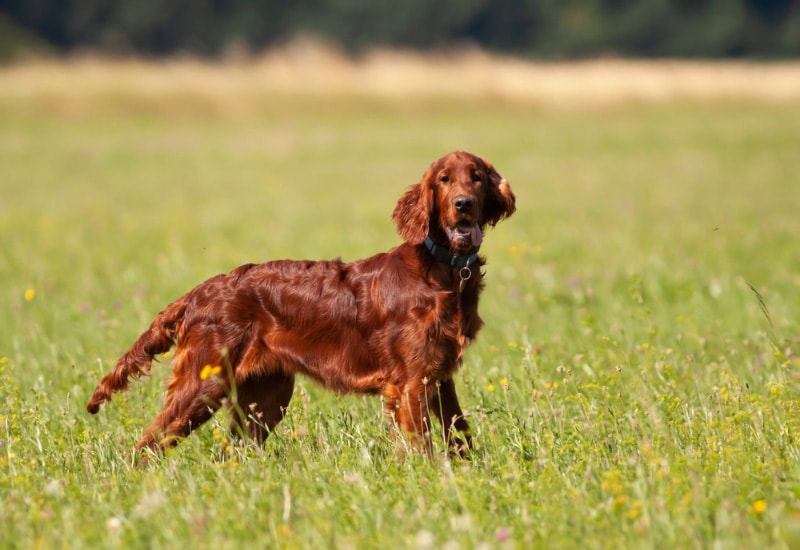Are Irish Setters Hypoallergenic? Vet-Reviewed Breed Characteristics & Tips
By Hanh Duong
Updated on

Click to Skip Ahead
Are you considering bringing an Irish Setter into your home? These gorgeous, large-sized dogs are beloved by families and sporting enthusiasts alike for their elegant and even-tempered companionship. Initially bred for bird hunting, these canines are beloved for their beauty, friendliness, and loyalty. They are great with children and other pets, but have a natural prey drive, so keeping a close eye on them around small animals is essential, as they love a good chase.
Approximately 10% to 20% of the population is allergic to dogs, so if you’re one of them, you’re certainly not alone. If you’re searching for a breed that might trigger less of a reaction, you may wonder if Irish Setters are a good fit for you. Although, there’s no such thing as a truly hypoallergenic dog, there are some breeds that are better for people with allergies than others. Unfortunately, Irish Setters aren’t the best for allergy sufferers. So, if you’re looking for a dog that’s less likely to aggravate your allergies, you may want to consider other options.
Are Irish Setters Hypoallergenic?
It’s worth noting that while no dogs are entirely hypoallergenic, certain breeds are less likely to cause allergic reactions in people. The primary culprit behind dog allergies is the proteins found in saliva, urine, oily secretions, and dander, which sticks to pet hair. However, some breeds possess a non-shedding coat that results in less of these allergens floating about, making them more allergy-friendly options.
The Irish Setter is adorable, but you need to know grooming is a big part of the deal. That long auburn hair requires daily attention to avoid matting, especially if you’re planning to take them out hunting; those luscious locks can attract prickles and burrs like a magnet. They are moderate shedders, which means that you might not end up with hair all over your clothes, furniture, and house, but they will still shed, particularly in the spring.

Dog Allergy Warning Signs
If you’re a dog person, but always end up sneezing and rubbing your itchy eyes whenever you’re around one, you may have a dog allergy. To know for sure, you’ll need to visit an allergy specialist and take an allergy test. This test will not only help you identify the triggers of your allergy, but also determine how severe it is. Keep in mind that the symptoms of dog allergy can vary from person to person, but the most common signs include:
- Runny nose
- Sneezing
- Watery eyes
- Itchiness or redness of the eyes
- Nasal congestion
- Itchiness in the nose, roof of mouth, or throat
- Facial pressure and/or pain
- Swollen, blue-tinged skin under the eyes
- Cough
- Postnasal drip
- Wheezing
- Shortness of breath
- Difficulty sleeping
- Chest tightness and/or pain
Dogs and Allergies
It’s time to address common misconceptions about dog breeds and allergies. The idea that short-haired dogs are safer than long-haired dogs has no scientific support. The truth is that individual dogs of the same breed can produce very different amounts of allergens.
So, what is the real cause of your allergies? It’s dander, saliva, and urine, not the dog’s hair or fur. This implies that every canine, regardless of their coat length, has the potential to cause an allergic reaction, even hairless breeds. It is essential to realize that people with allergies have hypersensitive immune systems, causing them to react adversely to harmless particles such as dog dander.
The good news is that your doctor can do a skin or blood test to see if you have the IgE (immunoglobulin E) antibody specific to allergens and confirm your concerns. It’s worth getting tested, even if you’re sure you have an allergy. Some people who mistakenly think they are allergic to dogs turn out to be allergic to mold or pollen that dogs bring in from outside.
If your allergy is severe, your doctor may recommend that you shouldn’t share your house with a dog. However, there are various treatments and remedies that can help you manage your allergy. For some people, the severity of their symptoms reduces over time, but for others, the allergy can intensify.

Tips for Dealing with Dog Allergies
Allergies can be pretty uncomfortable, but there are ways to manage them. Although it’s easier said than done, most experts concur that avoiding contact with dogs is the best action. Here are some tips to assist you:
- Watch out for visitors with pets. Dog dander can stick to clothing and luggage, even if owners leave their pets at home, which can be very troublesome for severe allergy sufferers. So if you are expecting guests who live with pets, you may want to prepare.
- Clean frequently. For allergy sufferers, your vacuum cleaner is your most powerful ally. Invest in a quality vacuum with a HEPA filter, which will capture those annoying allergens and keep them from dispersing throughout your home.
- Purify the air. Dog dander may wind up in every room of your home. To keep everything fresh and clean, you need a central air cleaner and filters for your vents. Portable air purifiers are also a great idea.
- Do not let your dog inside your bedroom. Your bedroom has to be free of allergens because you spend a lot of time sleeping. Make other sections of your house dog-free as well to protect yourself.
- Regular grooming. Get a family member or professional groomer to give your dog a good brush once a week, and a wash once a month. Be careful to use a gentle shampoo, as frequent shampooing can disrupt the oils in your dog’s skin, leading to greasy, flakey skin, which will make your allergy problems even worse.
- Daily maintenance. You can use wet wipes to give your dog’s coat some daily attention to reduce the amount of airborne dander. Make sure you only use a product designed specifically for pets to avoid drying their skin or causing irritation.
- Supplements to keep their coat and skin healthy. The healthier their coat, the less flaking and shedding there’ll be. Adding supplements to their food that contain essential fatty acids like Omega-3 can boost their health and help reduce their allergen load.
Best Allergy-Friendly Dog Breeds
Some breeds are less allergenic and better for those who suffer from allergies. Although no dog is 100% hypoallergenic, these dogs have a coat that doesn’t shed too much and produces less dander, possibly making them the ideal furry companions for you.
- Bedlington Terrier
- Miniature Schnauzer
- Coton de Tulear
- Bichon Frise
- Peruvian Inca Orchid (Hairless)
- Afghan Hound
- Giant Schnauzer
- Irish Water Spaniel
- American Hairless Terrier
- Lagotto Romagnolo
- Spanish Water Dog
- Kerry Blue Terrier
- Maltese
- Poodle
- Chinese Crested
- Portuguese Water Dog
- Soft-Coated Wheaten Terrier
Conclusion
Love Irish Setters, but allergies got you down? These adorable dogs are moderate shedders, with the potential to trigger your allergies. There are ways to reduce the amount of allergens they produce, minimize the allergen load in your home, and manage your allergy symptoms, but even so, you may want to consider a more allergy-friendly breed.
Dogs produce several allergens, so it’s useful to know which one is causing your symptoms. It is also worth knowing that being allergic to some dogs does not necessarily mean that you will be allergic to all dogs. If you are keen to welcome a canine companion into your home, talk to your doctor about how to learn more about your allergies so you can find a way to minimize your risks.
Featured Image Credit By: CC0 Public Domain, Pxhere
















